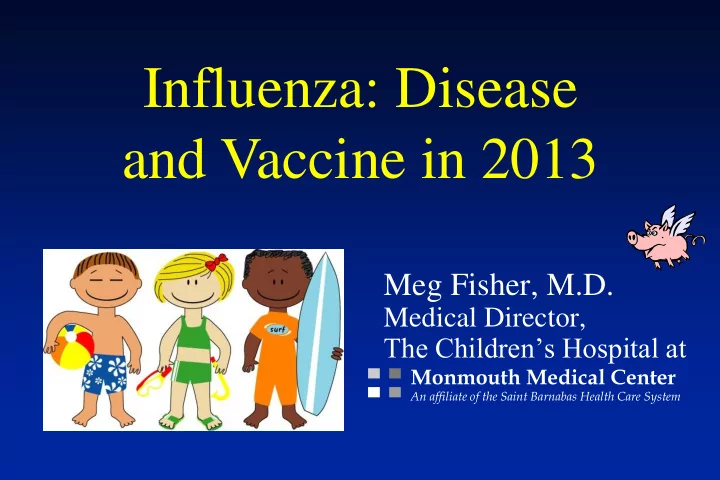

Influenza: Disease and Vaccine in 2013 Meg Fisher, M.D. Medical Director, The Children’s Hospital at Monmouth Medical Center An affiliate of the Saint Barnabas Health Care System
Objectives • Discuss epidemiology of influenza in New Jersey in 2013 • Diagnose influenza and prescribe antiviral agents for children • Counsel regarding influenza vaccination
“I had a little bird. His name was Enza. I opened the window. And in flew Enza.” A chant popular during the influenza pandemic of 1918
Influenza Viruses Orthomyxovirus Types A, B and C Yearly winter outbreaks of A and B Hemagglutinin (H) Neuraminidase (N)
Antigenic Changes Shift: Major change in surface Pandemics To date with A only Drift: Minor change in surface Yearly outbreaks
Influenza Pandemics 1918: H1 1957: H2 1968: H3 1977: H1 2009: H1N1
Animal strains Birds: virus in the gut Pigs 2009 H1N1: pig, avian and human influenza genes - novel H5N1: avian strain
Influenza: The Illness Symptoms: fever, chills, aches, malaise, myalgia, gastrointestinal in younger Signs: fever, pharyngitis, rhinitis, cough
Epidemiology Usually winter outbreaks Cruise ship outbreaks - Alaska in summer Children - major role as transmitters Droplet and contact spread Contagious 1 day before to 7 days after Incubation 1 to 3 days
Children and Influenza Highest attack rates: 15-42% yearly Highest hospitalization rates Major transmitters: shed higher titers for longer times, poor hygiene and less control of nasal excretions
Complications of Influenza Bacterial superinfection Reye syndrome Triggers asthma Myositis Encephalitis
Influenza Diagnosis Clinical: generally sufficient Culture: throat gargle or nasal wash Antigen detection: rapid but lack sensitivity (40-70%) Serology not clinically useful
Management of Influenza Symptomatic: Antipyretics may prolong viral shedding Aspirin contraindicated Complementary therapies abound Antivirals: two available and useful
Antivirals for Influenza Shorten the course and decrease virus Start early for maximal effect Opinions vary as to who should receive antiviral therapy My opinion: yes for most
Children at Risk Underlying diseases: the usual suspects Neuromuscular and developmental Obese Age under 5 but especially under 2 years
Oseltamivir (Tamiflu) Neuraminidase inhibitor, prevents viral entry Effective for influenza A and B Dose varies by age and weight Side effects mild, gastrointestinal
Zanamivir (Relenza) Neuraminidase inhibitor, prevents viral entry Effective for influenza A and B Dose: 10 mg bid, inhaled Precaution in patients with bronchospasm
Prevention of Influenza Infection control Hand washing and hand hygiene Isolation Limit visitors Respiratory hygiene: tissues and sleeves
Inactivated Influenza Vaccine Composition altered yearly Trivalent: 2 A and 1 B Split product No adjuvants Quadravalent planned
Indications Everyone 6 months and older High risk, especially important Healthcare providers: mandates suggested Immunize pregnant women to protect them and their infants
Vaccine Schedule Yearly, as soon as you get it Child 8 and under: two doses, first season Age 9 and above: one dose Contraindicated in persons with anaphylaxis to chicken or eggs
Live Attenuated Vaccine Cold adapted virus Won’t survive body temperature Immunogenic Safe, rarely transmitted Approved in 2003
Live Attenuated Vaccine Healthy people 2 to 50 years of age Nasal spray Not for use in at risk people OK for healthcare providers and family members, unless their contacts are severely immunosuppressed
Vaccine Efficacy • Depends on the match of vaccine strains to circulating strains • Age related • Less in young and elderly • Generally 40 to 60%
Chemoprophylaxis Oseltamivir approved for age 1 + yr Zanamivir approved for age 5 + yr When: unable to vaccinate or unlikely to respond to vaccine or while waiting High risk when vaccine mismatch Outbreak in long term care facility Consider for close contacts
Smiling is a contagious condition!
Resources www.cdc.gov/flu/ www.aap.org/immunization www.cdc.gov/vaccinesafety/ www.aapnj.org www.state.nj.us/health/flu/ www.healthychildren.org
Recommend
More recommend